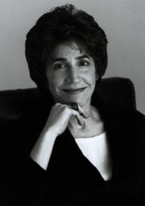




 |
 |
|
 |
 |
 |
Stephanie Golden |
|
|
other speakers: S.Lacy | J. Haaken | ||
Stephanie
Golden is an independent scholar, journalist and medical writer who lives
in Brooklyn, New York. Her presentations at the conference will be based
on two of her four books: Slaying the Mermaid: Women and the Culture
of Sacrifice (Harmony Books, 1998) and The Women Outside: Myths and
Meanings of Homelessness  (University
of California Press, 1992), which was a finalist for the Robert F. Kennedy
Book Award. (University
of California Press, 1992), which was a finalist for the Robert F. Kennedy
Book Award.Stephanie has written two other books: Compulsive Behavior (Chelsea House, 1993), a book about obsessive-compulsive disorder for teenagers, and a fitness/exercise book, Body Rolling: An Experiential Approach to Complete Muscle Release, co-authored with Yamuna Zake (Healing Arts Press, 1997). Currently she's writing a consumer guide to anesthesia with an anesthesiologist, to be published by Rutgers University Press. Periodicals for which Stephanie has written include Brooklyn Bridge, the San Francisco Chronicle, New York Newsday, City Limits, and Yoga Journal. Both
Slaying the Mermaid and The Women Outside derive from |
| She
says: |
||
|
Working in the shelter was one of the defining experiences of my life. Having led a rather narrowly restricted middle-class life, I had never done any such work before, or encountered people in extremity. I felt like I'd been thrown into deep water without having learned to swim. At the same time, this was my first encounter with the power of spirit. The nuns
had created in the shelter a powerful community of spirit, which, I discovered,
could heal the traumatized homeless women, bring them inside and connect
them to community. The orthodox approach of professional social service
agencies at the time generally failed to do this; most social workers
labeled homeless women "hard to reach." The nuns' work was tremendously inspiring, and in The Women Outside and much of my journalism, I explored both the social power structures that marginalize people, especially women, and the different ways that community and a sense of connectedness could heal them and bring them inside society. But there was a flaw in the nuns' approach to their mission that left them vulnerable to disaster. Their radical experiment was aborted when they were taken over - brainwashed - by a male volunteer who briefly created a mini-cult in the shelter. |
As a volunteer I too had struggled with the question of self-sacrifice - that is, how much to give - where I should draw the line. But it is also a question most women grapple with, because almost all of us have been trained in self-sacrifice. Deciding to explore the concept of sacrifice in relation to women's experience, I discovered during interviews for the book that quite ordinary women had had astonishing, intense experiences related to sacrifice; lived with wrenching, violent inner images; and also clung to powerful ideals. Thus Slaying the Mermaid is about how to maintain a commitment to caring and to service, and ultimately a connection to a spiritual ideal, without falling into identification with pain and victimhood and sacrificing the strength of one's own selfhood. |
|
|
Stephanie
Golden: top | cv | bibliography
|
other speakers: J.Haaken | S.Lacy | ||
|
Vita: Stephanie Golden |
|
|
|
|
|
|
|
|
|
|
|
|
|
|
|
|
|
|
|
|
|
|
|
|
|
|
|
|
|
|
|
|
|
|
|
|
|
|
|
|
|
| other speakers: J.Haaken | S.Lacy | |||
|
||||
|
| other speakers: J.Haaken | S.Lacy | |||